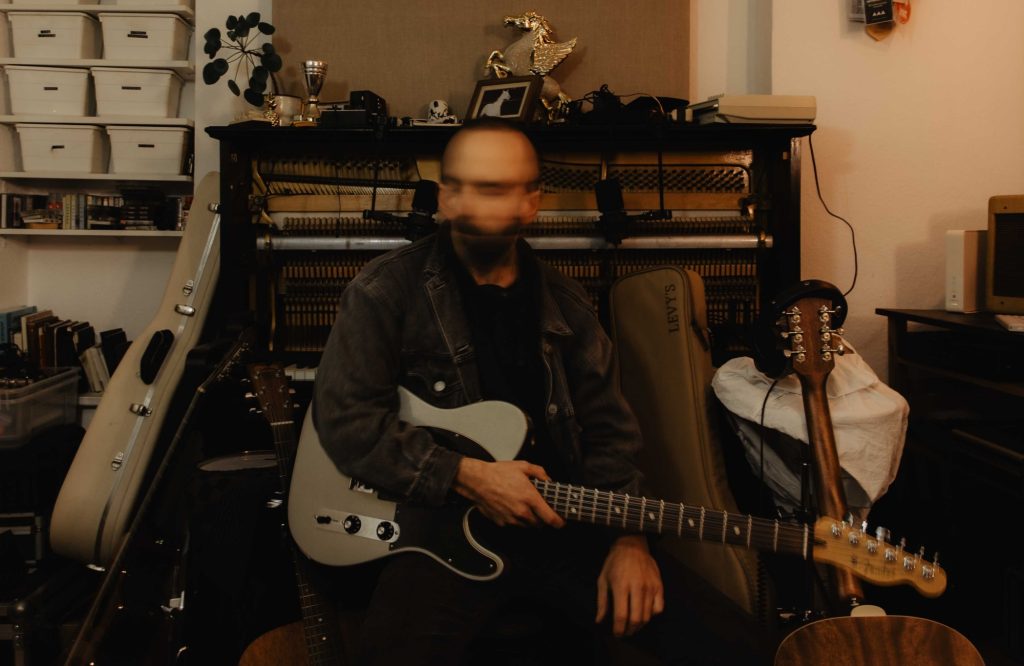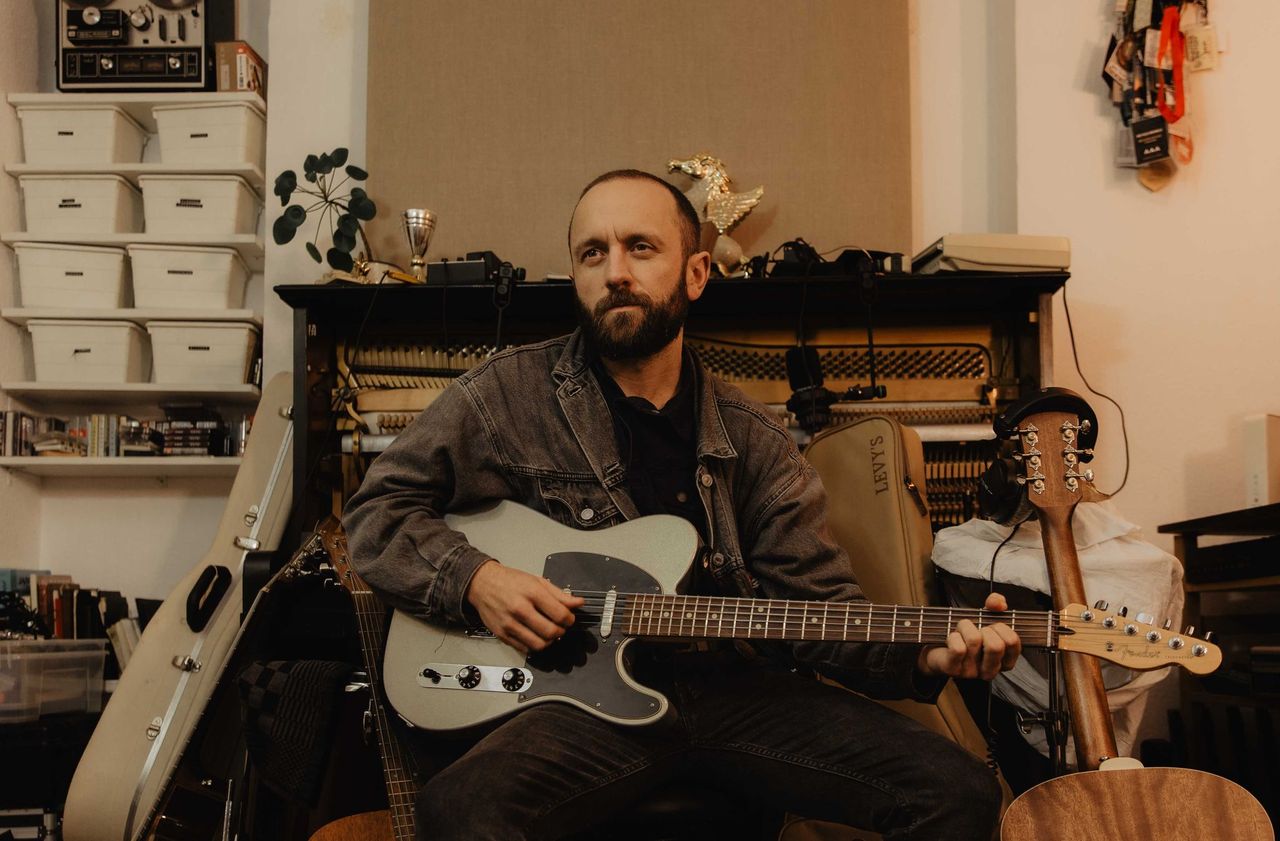For over a decade, the socially conscious and politically aware Missouri-born-and-raised musician Ian Fisher has been consistently toiling as a hard-working, independent musician. Calling into Post-Burnout via Zoom while using the free wi-fi from a Tennessean McDonald’s while en route to his next show at Nashville’s AMERICANAFEST, Ian tells us of his background.
“On a stylistic level, I was very inspired by growing up in a small town in Missouri,” he says. “I mean, the first concert that I went to was Garth Brooks. I grew up on country music. I grew up working every summer with my grandpa on the farm and working all the time with my dad, as a carpenter. I was a redneck, and I still am at heart. I still like going to stock car races and have go-karts and shit. I shoot beer cans on my farm. Deep down, I’m still a little redneck”
Despite his love for his hometown, Ian was aware of what it lacked, and the insufficiencies that he saw in local infrastructures piqued his initial interest in politics. “My mom was diagnosed with cancer when I was really young and had it for 26 years,” Ian says. “And I just saw all that she went through, with being lucky that she had worked at an insurance agency and that’s kind of what kept her alive, and if she was completely dependent on the State, then she would have died when I was a kid.
“And that was one of the first things that started to politicise me. And then, when George W. Bush was elected and it was just so obvious that what they were doing was wrong, when it came to the invasion of Iraq and just going behind people’s backs, like the United Nations, to do these things that were against international law. That kind of politicised me more.”
In 2008, after protesting against the US Government, getting involved with grassroots organisations at home, and writing about American politics in his music throughout the 2000s, Ian moved to Vienna, Austria to continue his studies. Appropriately, he studied politics.
“That kind of pacified me a bit, because a lot of the things I wanted here, they were already happening over there,” Ian says of the move. “Like having a mass transit system or having socialised medicine. Those were all things that I wanted the US to have, and I got over there and I had ‘em. That was one of the things that kind of depoliticised my music on a superficial level, anyway. The ideology is still kind of there in the DNA of it all, it’s just that I’m not singing blatantly about labour rights or something like that.
“So, in moving over there, I feel like there’s this general cynicism in mainland Europe, which was probably influenced by the wars or hundreds of years of struggle, whether it be through wars or oligarchical structures and poverty. Or maybe it’s just a social thing? I don’t know. But the cynicism definitely affected me, and my music got a lot darker, I would say. And, also, a lot more analytical and self-analytical, especially living in Vienna. Like, my music took more of a psychological current, [Laughs] which growing up in a very avoidant, passive-aggressive, superficial, midwestern culture, you don’t really get, you know?”

Courtesy of Reybee, Inc.
Ian found a lot of success in Europe. He moved a few times between Austria and Germany and successfully and consistently toured the continent while accruing a fanbase, but he mainly considers Vienna to be his European home base. We asked Ian if it was initially difficult to move to Europe during the Bush administration, which, if you weren’t around for it, brought a lot of unnecessary scrutiny on Americans abroad.
“When I first moved to Austria in 2008, right before the [Presidential] election [between Barack Obama and John McCain], and George W. Bush was still in office, I would literally apologise to people when I would meet them, for being American,” Ian responds. “There was this general feeling, that I got anyway, of being wrong [Laughs] and having wronged the world.
“And people, especially when they would find out that I’m from a small town in the middle of Nowhere, America, they would treat me different. They would be unnecessarily cruel. And I found, not only because of the Obama years but also because Europe has gone so far to the right in the last sixteen years, that the moral high ground that they had in 2008 has completely fucking disintegrated. So, if someone wants to tell me, ‘Oh, look at how terrible your country is,’ I could so easily just turn it around on ‘em, nowadays.”
Ian continues, “I think the average person, not only European but everywhere around the world – whether I go to South Africa or Japan or wherever – the average person thinks that they know a lot more about America than they actually do, because […] you watch American TV, you listen to American bands, you’ve read American books.
“That’s what a lot of people do, especially in the Western world. They think that they know so much about the US, even if they’ve never been here or they’ve been here but they’ve only been to New York and L.A., which are, yes, part of the US, but definitely don’t represent all 350 million people in a country that’s a couple of times bigger than Europe.
“So, people think they know so much more, and one thing I just started to do, eventually, is when I would introduce myself and they would ask me where I’m from, I would say that I am from Missouri, and, the vast majority of the time, people wouldn’t know where that was; they would ask, ‘What state is that in?’ [Laughs], or they would just have no clue, and that, in itself, would make it clear to them, immediately, that they know nothing about where I’m from. They might have watched a TV show once, but that maybe just has a spark of reality to it.”
Recently, Ian relocated to Canada. “It’s just a whole other neoliberal situation,” he says of his experience. “It’s a real slap in the face on an economic level, just because Toronto is so unbearably expensive that it makes it really hard. Because, having lived in Germany and Austria for the last fifteen years, that was one of the ways that I was able to get by, as a musician, because you could actually afford to be a middle-class musician there because there’s a social state and there’s some protections on rent. At least in Vienna, anyway. There’s a lot of social housing. And, in Toronto, it’s just a complete free market rule, which is very frustrating. Of course, there’s some socialised medicine, but the Ontario provincial government’s trying really hard to destroy it, so it just gets worse every year.”
Last year, Ian’s mother, unfortunately, passed away from cancer. This year, Ian released two singles, “The Face of Losing” in August and “Independence Day” which came out today, to commemorate her. The songs are part of an album that Ian will release in February, called Go Gentle, which will examine grief in greater detail.
“Every song on the record is about that,” Ian says. “It was my way of forcing myself to confront it because I didn’t really want to think about it and I didn’t want to have to continually deal with this, but I feel like [it’s] the only way that I would, which I think our societies should do more often because we’re so avoidant about talking or thinking about death, which I think is extremely unhealthy and I’m also to blame in my daily life.
“I wrote these songs, and perform them now and release them now, as a way of not only dealing with it myself and making it all real and accepting it, truly and fully, and also just remembering her and memorialising her in a way, but also as a way of bringing the topic up with people and trying to make people feel OK about talking about loss and grief because if we don’t, it’s really toxic. We live a lie, essentially. It just increases that void that we feel, and this lack of connection to our souls, this lack of spirituality in temporary society, and a healthy one; not some cult-like thing, but just the relationship with ourselves and who we are and the people that we truly love and still love. All these songs are about losing my mom and what that feels like, what that means, and it’s been tough, to say the least.”
While delving into the grief was difficult, the outcome of that exercise was surprisingly optimistic and gave Ian an interesting perspective on death. “I don’t view it as final,” he says. “There’s a lot on this album that, actually, is talking about the opposite of the finality of death. Not in the sense of the classic Christian idea of Heaven, per se, but more so that I truly feel that my mom is still in me and with me and who I’ve become. I mean, her actions and her love and who she was, still shapes me and all of my actions today, and she still lives on inside of me through that, and [Laughs] just in my DNA! Like, I wouldn’t physically exist if it wasn’t for her.
“I feel like there’s so much evidence of her existence and her continued existence in me and in the people that she’s loved. And I’m not talking about Heaven or Hell or any of that; I’m just talking about reality. She’s really here, in that sense. I know that she’s not physically here and she can’t continue to make the same type of decisions or actions as she once did, but I don’t view it as final. I view her existence as just something that changed.”
Ian Fisher’s latest single, “Independence Day,” is on all streaming platforms from today. His next album, Go Gentle, is expected to be released in February 2025. For the rest of the year and into the next, Ian will tour the United States, Canada, Austria, and Germany. Ian’s music, live dates, and social media accounts can be found on his website.
Tune into POSTBURNOUT.COM Interviews… tomorrow at 21:00 (IST) to hear this interview in full. Available on YouTube, Spotify, Apple Podcasts, and Amazon Music Podcasts.

Aaron Kavanagh is the Founder and Editor-in-Chief of Post-Burnout. His writing can also be found in the Irish Daily Star, Buzz.ie, Totally Dublin, The GOO, Headstuff, New Noise Magazine, XS Noize, DSCVRD and more.

 POST-BURNOUT
POST-BURNOUT